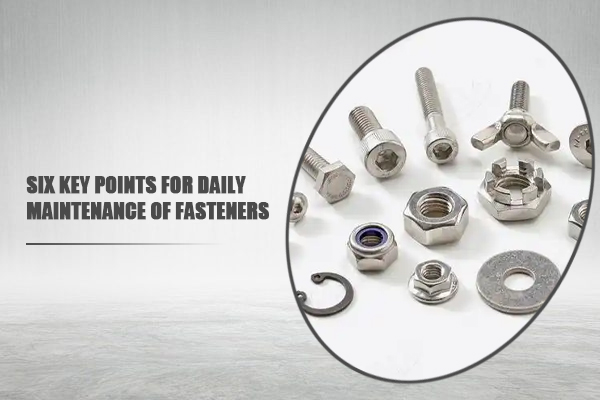VIDEO & CENTER

When using fasteners, attention to details is crucial. The performance of the fasteners is very important. Regular maintenance is key to ensuring the normal operation of the machinery. To prevent any problems with the fasteners, when conducting daily maintenance of the fasteners, several key points must be noted.

- Pollution caused during rinsing.
After the fasteners have been quenched, they need to be cleaned with a silicate cleaning agent and then rinsed. Therefore, during the rinsing process, one must be extremely careful to prevent any residues from remaining.
- The fasteners are improperly stacked.
After tempering, the fasteners will show signs of discoloration. After being soaked in ether, there may be oily residues, indicating that the surface of the fasteners is not clean. After analysis, it was found that the fasteners were improperly stacked during heating, resulting in slight oxidation of the fasteners in the quenching oil.
- Surface Residues.
There is a white residue on the high-strength screws. Through analysis using an instrument, it was confirmed to be a phosphating substance. This reaction occurred because no acidic cleaning machine was used for cleaning, and the inspection of the rinsing tank was not thorough enough.
- Alkali Burn.
The residual heat from the quenching of high-strength screws turns them black, with a uniform and smooth black outer surface. After inspection, it was found to be caused by alkaline burns. Therefore, in steel fasteners, the surface alkaline substances cannot be removed in the quenching oil, resulting in surface burns at high temperatures and aggravated damage during tempering. It is recommended to thoroughly clean and rinse the fasteners before heat treatment, completely removing the alkaline residues that cause the fasteners to burn.
- Improper rinsing.
For large-sized fasteners, polymer aqueous solutions are often used for quenching. Before quenching, the fasteners are cleaned and rinsed with an alkaline cleaning machine. After quenching, the fasteners have already rusted on the inner side. Therefore, the rinsing water should be changed frequently to ensure that the fasteners do not rust during rinsing.
Six. Excessive rusting.
High-strength fasteners often show some black stripes. These black stripes are contaminants left on the surface, which are dried-out quenching oil. They are the result of the evaporation of gas-phase substances during the quenching process. Since the quenching oil has aged excessively, it is recommended to add new oil.














